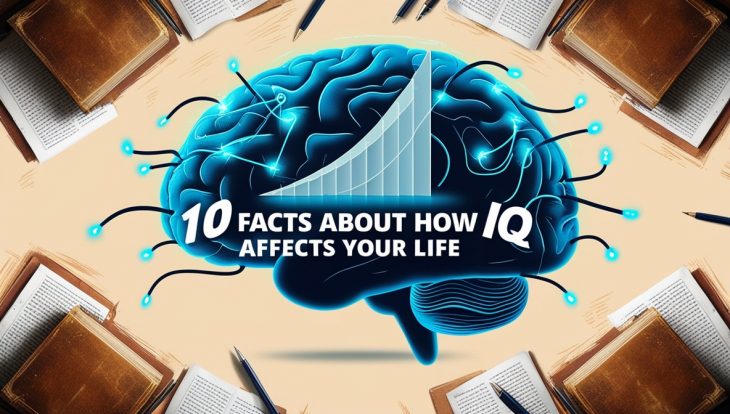
IQ is most of the time described as a measure of one’s intelligence, but it goes beyond that as it includes executive functioning and achievements. It needs to be understood that though the intelligence quotient does not dictate the success and happiness of a person completely, there are still several ways in which it is a factor. Here are ten important ideas about how IQ influences your existence.
1. Academic Achievement
The relationship between intelligence and academic achievement is the most obvious of all intelligence measures. The authors affirmed that in general, students who score well in a free IQ test online get better grades and perform well in standardized tests. This is especially so because they have much higher cognitive abilities, the capability to solve problems and to think critically, and short concentration spans that make it easier for them to grasp new concepts.
2. Career Opportunities
There is evidence that IQ does influence one’s employability in the job market. An important prerequisite of many occupations is a certain level of intelligence; superior intelligence is also associated with higher effectiveness in carrying out professional activity and with a higher rank that results from the nature of professional occupations. Get trading professional business sectors like engineering and medicine and others, including education, get higher IQ people and excess job opportunities and promotion opportunities.
3. Income Levels
In other empirical studies, it has been found that there exists a direct correlation between IQ and earnings. People with higher IQs give higher returns over their lifespan in comparison to the ones with lower IQ scores. This might be because intelligence enhances work performance, efficiency, and problem-solving skills; all factors that are desirable in employees.
4. Social Skills and Relationships
Even though IQ is focused mainly on mental competencies it can also affect the ways people communicate. People with good IQ are likely to manage technical social interactions and interpersonal conflict resolution systems due to logic and knowledge strengths. Nevertheless, it is significant to point out that emotions are the key to establishing interpersonal interactions and rational intelligence is inert to interpersonal interactions.
5. Health and Longevity
Some cross-sectional researchers have found that intelligence is positively correlated with well-being, where intellectually superior individuals exhibit better health. Intelligence is positively associated with exercise, proper diet, and healthcare utilization with those of high intelligence better able to access and seek appropriate healthcare. Such attitudes to health can increase the length of one’s life as a result of early intervention.
6. Problem-Solving Abilities
Problem-solving ability is directly related to the increase in intelligence quotient which is in ascendancy. People at a higher cognitive level are usually better placed in terms of analyzing a situation, recognizing a pattern, or learning how best to rectify it. This particular skill is very useful in one’s daily life and helpful in many situations making it easier to solve problems.
7. Adaptability to Change
With every passing day, the world is becoming a different place, and flexibility is an essential asset. The information and results above imply that higher IQ people think more flexibly and have a better perceptive or adaptive ability to new conditions. This is because it is now possible for organizations to be successful as they adapt to a turbulent environment that requires innovation in decision-making.
8. Learning Styles
There is evidence that shows that IQ predicts learning preferences. High-animal-learning students might do well in situations that demand study on one’s own or problem-solving, whereas low-animal-learning students would probably do just as well in unambiguous conditions. These differences mean that learning strategies should be developed to benefit the individuals in their learning abilities.
9. Coping Mechanisms
Intelligent individuals thereby tend to acquire superior defensive coping styles when under stress or in adversity. They can evaluate the circumstances and come up with appropriate actions instead of being emotional and acting on impulse. This results in improved mental health and can enable people to deal with difficult situations in life.
10. Cultural Perceptions of Intelligence
Last, of all, the way society views intelligence can impact the self-esteem of an individual as well as the chances of the same person getting a particular job. In cultures where education is valued, those with a high intelligence quotient (IQ) are more likely to be rewarded with honor or respect and, consequently, increase their self-esteem and social status. Conversely, in environments where emotional intelligence is prioritized, individuals may feel undervalued despite high cognitive abilities.
Conclusion
While IQ is just one of many factors that shape our lives, its influence is undeniable. From academic success to career advancement and even health outcomes, a higher IQ can open doors and create opportunities. However, it’s essential to remember that intelligence comes in various forms, and emotional intelligence, creativity, resilience, and interpersonal skills also play critical roles in achieving fulfillment and success in life. Ultimately, understanding the multifaceted nature of intelligence allows us to appreciate the diverse strengths that individuals bring to the table.
Was this page helpful?
Our commitment to delivering trustworthy and engaging content is at the heart of what we do. Each fact on our site is contributed by real users like you, bringing a wealth of diverse insights and information. To ensure the highest standards of accuracy and reliability, our dedicated editors meticulously review each submission. This process guarantees that the facts we share are not only fascinating but also credible. Trust in our commitment to quality and authenticity as you explore and learn with us.
